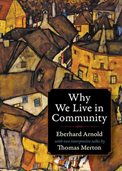-
Saints are not like the rest of us, but the Dorothy Day in these pages is. Her reflections leave one wondering whether what made her so fascinating was that she took the simple teaching of her faith at face value and to heart.
Library Journal
-
If you have any degree of devotion to, affection for, or interest in Dorothy Day, The Reckless Way of Love is a must-have addition to your library. The selections are carefully, even prayerfully chosen and meticulously organized.
Mark Gordon, The Dorothy Option, Patheos.com
-
In his speech to Congress during his 2015 visit to the United States, Pope Francis held up Dorothy Day as an example of the selflessness needed today, saying, ‘Her social activism, her passion for justice and for the cause of the oppressed were inspired by the gospel, her faith, and the example of the saints.’ In The Reckless Way of Love, a compilation of her writings, Day expounds on the driving force behind this love of service: her persistent faith in God.
Our Sunday Visitor
-
This thoughtful collection of Day’s reflections incorporates abundant material for contemplation, all drawn from her extensive writings … [which] reveal Day’s signature honesty and frequent humor in addressing her hopes and fears and the sources of her inspiration.…This welcome compilation provides a window into the fundamental beliefs that undergirded Day’s life of faith.
Publishers Weekly, starred review
-
Plough Publishing has rendered all spiritual souls a great service by putting together this collection of excerpts from the writings of Dorothy Day... When she died in 1980, she owned a creaking bed, a writing desk, a bookshelf, a teapot, and a radio. Her spiritual legacy was immense.
Spirituality and Practice
-
‘I do not need to retire to my room to pray,’ [Dorothy Day] writes. ‘It is enough to get out and walk in the wilderness of the streets.’ Walking in the wilderness of the streets is something I can do, situated as I am in a city where need and injustice abounds. As D. L. Mayfield explains in the introduction, Day was no saint: she was ‘an ordinary person simply trying to walk the road of following Christ’. This is precisely why her reflections on following Jesus are worthy of study.
Elizabeth Palmer, Christian Century
-
Saints are not like the rest of us, but the Dorothy Day in these pages is. Her reflections leave one wondering whether what made her so fascinating was that she took the simple teaching of her faith at face value and to heart.
Library Journal
-
If you have any degree of devotion to, affection for, or interest in Dorothy Day, The Reckless Way of Love is a must-have addition to your library. The selections are carefully, even prayerfully chosen and meticulously organized.
Mark Gordon, The Dorothy Option, Patheos.com
-
In his speech to Congress during his 2015 visit to the United States, Pope Francis held up Dorothy Day as an example of the selflessness needed today, saying, ‘Her social activism, her passion for justice and for the cause of the oppressed were inspired by the gospel, her faith, and the example of the saints.’ In The Reckless Way of Love, a compilation of her writings, Day expounds on the driving force behind this love of service: her persistent faith in God.
Our Sunday Visitor
-
This thoughtful collection of Day’s reflections incorporates abundant material for contemplation, all drawn from her extensive writings … [which] reveal Day’s signature honesty and frequent humor in addressing her hopes and fears and the sources of her inspiration.…This welcome compilation provides a window into the fundamental beliefs that undergirded Day’s life of faith.
Publishers Weekly, starred review
-
Plough Publishing has rendered all spiritual souls a great service by putting together this collection of excerpts from the writings of Dorothy Day... When she died in 1980, she owned a creaking bed, a writing desk, a bookshelf, a teapot, and a radio. Her spiritual legacy was immense.
Spirituality and Practice
-
‘I do not need to retire to my room to pray,’ [Dorothy Day] writes. ‘It is enough to get out and walk in the wilderness of the streets.’ Walking in the wilderness of the streets is something I can do, situated as I am in a city where need and injustice abounds. As D. L. Mayfield explains in the introduction, Day was no saint: she was ‘an ordinary person simply trying to walk the road of following Christ’. This is precisely why her reflections on following Jesus are worthy of study.
Elizabeth Palmer, Christian Century
-
Saints are not like the rest of us, but the Dorothy Day in these pages is. Her reflections leave one wondering whether what made her so fascinating was that she took the simple teaching of her faith at face value and to heart.
Library Journal
-
If you have any degree of devotion to, affection for, or interest in Dorothy Day, The Reckless Way of Love is a must-have addition to your library. The selections are carefully, even prayerfully chosen and meticulously organized.
Mark Gordon, The Dorothy Option, Patheos.com
-
In his speech to Congress during his 2015 visit to the United States, Pope Francis held up Dorothy Day as an example of the selflessness needed today, saying, ‘Her social activism, her passion for justice and for the cause of the oppressed were inspired by the gospel, her faith, and the example of the saints.’ In The Reckless Way of Love, a compilation of her writings, Day expounds on the driving force behind this love of service: her persistent faith in God.
Our Sunday Visitor
-
This thoughtful collection of Day’s reflections incorporates abundant material for contemplation, all drawn from her extensive writings … [which] reveal Day’s signature honesty and frequent humor in addressing her hopes and fears and the sources of her inspiration.…This welcome compilation provides a window into the fundamental beliefs that undergirded Day’s life of faith.
Publishers Weekly, starred review











